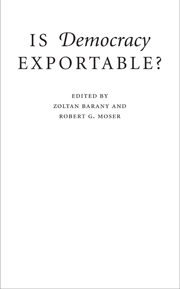Book contents
- Frontmatter
- Contents
- Contributors
- Acknowledgments
- Introduction
- A MORAL IMPERATIVE?
- STRUCTURAL PRECONDITIONS
- INSTITUTIONS AND PROCESSES
- 6 Electoral Engineering in New Democracies: Can Preferred Electoral Outcomes Be Engineered?
- 7 Does It Matter How a Constitution Is Created?
- 8 Building Democratic Armies
- 9 Democratization, Conflict, and Trade
- 10 Exporting Democracy: Does It Work?
- Conclusion: Is Democracy Exportable?
- Bibliography
- Index
9 - Democratization, Conflict, and Trade
Published online by Cambridge University Press: 05 June 2012
- Frontmatter
- Contents
- Contributors
- Acknowledgments
- Introduction
- A MORAL IMPERATIVE?
- STRUCTURAL PRECONDITIONS
- INSTITUTIONS AND PROCESSES
- 6 Electoral Engineering in New Democracies: Can Preferred Electoral Outcomes Be Engineered?
- 7 Does It Matter How a Constitution Is Created?
- 8 Building Democratic Armies
- 9 Democratization, Conflict, and Trade
- 10 Exporting Democracy: Does It Work?
- Conclusion: Is Democracy Exportable?
- Bibliography
- Index
Summary
In recent years, promoting democracy has become a cornerstone of United States foreign policy. In his 1994 State of the Union address, President Bill Clinton identified the absence of war among democracies as a principle reason to foster democratization throughout the world. President George W. Bush has pursued this goal even more forcefully, arguing that democracy in the Middle East and elsewhere will enhance the security of the United States. In many ways, these calls are hardly new. Early in the twentieth century, Woodrow Wilson advanced the view that democracy and peace were mutually reinforcing. Near the end of the Cold War, Ronald Reagan echoed this claim. Equally, Western policy makers and various international institutions have argued that democratization should be encouraged because it yields economic reform and prosperity. Among the hopes expressed by these individuals is that democratization will prompt the liberalization of foreign commerce, thereby expanding and deepening the open international trading system.
There is ample reason to expect that, in the long run, political liberalization culminating in the establishment of stable, mature democracies will widen the zone of peace and prosperity. In the short run, however, democratic transitions frequently promote war and undermine economic reform. Of course, not all democratic transitions are tumultuous. Those that occur in the face of strong, stable domestic institutions are often peaceful and facilitate improved economic performance.
- Type
- Chapter
- Information
- Is Democracy Exportable? , pp. 205 - 221Publisher: Cambridge University PressPrint publication year: 2009

